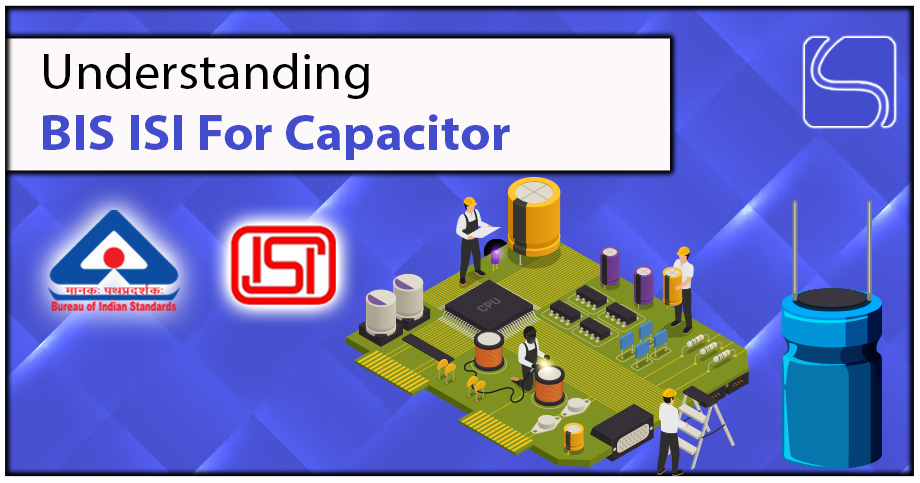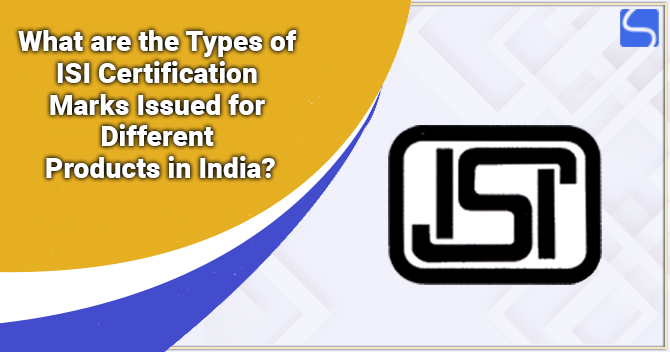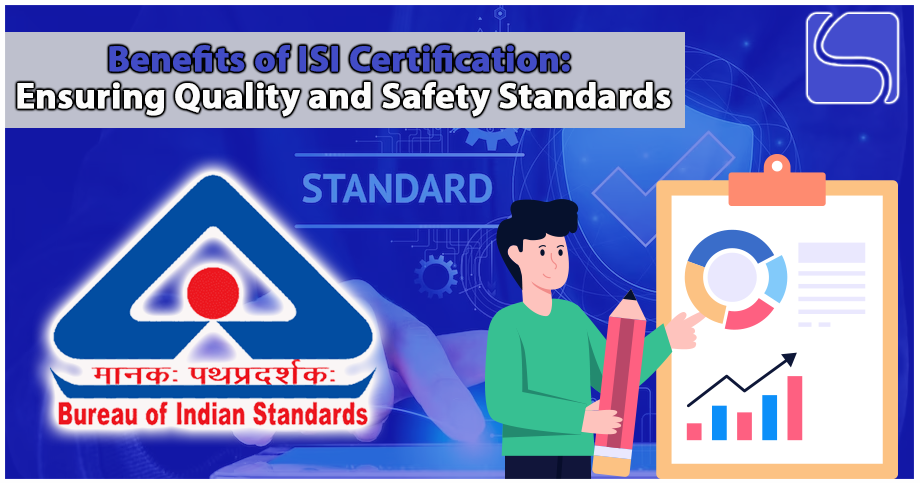Understanding BIS ISI For Capacitors

Shivam Narwal | Updated: Mar 20, 2023 | Category: ISI Certification
Bureau of Indian Standards (BIS) and Indian Standards Institute (ISI) are regulatory bodies that are responsible for ensuring that products manufactured in India meet the required quality standards. This includes electrical components such as capacitors.
Capacitors are widely used in electronic devices and electrical systems to store and release electrical energy. They come in different shapes, sizes, and specifications. BIS and ISI have established standards that capacitors manufacturers in India must follow to ensure the quality and safety of the capacitors.
ISI for capacitors is important for because they provide assurance to the customers that the product, they are purchasing meets the required quality standards. In this blog post, we will discuss the ISI for capacitors and their importance.
Table of Contents
BIS and ISI Standards for Capacitors
BIS and ISI have established standards for capacitors that manufacturers must adhere to. The following are some of the important standards:
- IS 1709: This standard specifies the requirements for capacitors for use in electronic circuits. It covers the general requirements, constructional requirements, and testing requirements for capacitors.
- IS 13340: This standard specifies the requirements for capacitors for use in power factor correction equipment. It covers the general requirements, constructional requirements, and testing requirements for capacitors.
- IS 2993: This standard specifies the requirements for motor-start capacitors[1]. It covers the general requirements, constructional requirements, and testing requirements for capacitors used in single-phase induction motors.
- IS 2994: This standard specifies the requirements for motor-run capacitors. It covers the general requirements, constructional requirements, and testing requirements for capacitors used in single-phase induction motors.
- IS 1569: This standard specifies the requirements for high voltage capacitors. It covers the general requirements, constructional requirements, and testing requirements for capacitors used in high voltage applications.
Importance of BIS and ISI certifications for capacitors
BIS and ISI certifications are important for capacitors because they provide assurance to the customers that the product, they are purchasing meets the required quality standards. The following are some of the importance of BIS certifications for capacitors:
- Quality Assurance: BIS and ISI certifications ensure that the capacitors manufactured in India meet the required quality standards. This ensures that the customers get high-quality products that are reliable and safe to use.
- Compliance with Regulations: BIS and ISI certifications ensure that the capacitors manufactured in India comply with the regulatory requirements. This ensures that the capacitors are safe to use and do not pose any risk to the users.
- Brand Reputation: BIS and ISI certifications help build the brand reputation of the capacitors manufacturers. Customers are more likely to trust the products that have been certified by BIS and ISI.
- International Acceptance: BIS and ISI certifications increase the acceptance of the capacitors manufactured in India in the international market. This helps the capacitors manufacturers to expand their business globally.
How to obtain ISI for capacitors?
The following are the steps to obtain BIS and ISI for capacitors:
- Application: The first step is to submit an application to BIS or ISI for certification.
- Testing: The capacitors must undergo testing to ensure that they meet the required quality standards.
- Inspection: BIS or ISI will conduct an inspection of the manufacturing facility to ensure that the capacitors are manufactured as per the required standards.
- Grant of Certification: If the capacitors pass the testing and inspection, BIS or ISI will grant the certification.
- Renewal: The certification must be renewed periodically to ensure that the capacitors continue to meet the required quality standards.
- Labelling: After obtaining the certification, the capacitors must be labelled with the BIS or ISI mark. This mark indicates that the capacitors have been certified by BIS or ISI and comply with the required quality standards.
Benefits of using BIS and ISI certified capacitors.
Using ISI for capacitors offers several benefits. The following are some of the benefits of using BIS and ISI-certified capacitors:
- High-quality and reliable: BIS and ISI certified capacitors are of high quality and are reliable. This ensures that they perform as per the required specifications and have a long lifespan.
- Safe to use: BIS and ISI certified capacitors are safe to use. They comply with the regulatory requirements and do not pose any risk to the users.
- Energy-efficient: BIS and ISI certified capacitors are energy-efficient. This ensures that they consume less power and help reduce energy costs.
- Reduced downtime: BIS and ISI certified capacitors have a longer lifespan and are less likely to fail. This reduces the downtime and maintenance costs.
- Easy to source: BIS and ISI certified capacitors are easily available in the market. This makes it easier for customers to source the capacitors from reliable sources.
Importance of using high-quality capacitors in various applications
Capacitors are widely used in various applications, including electronics, power systems, and automotive industries. The quality of capacitors used in these applications plays a crucial role in their performance, safety, and reliability. Here are some examples of how the quality of capacitors can impact different applications:
- Electronics: Capacitors are used in electronic devices, such as computers, mobile phones, and televisions, to store electrical charge and regulate voltage. Low-quality capacitors in these devices can cause issues like overheating, short circuits, and device failure.
- Power systems: Capacitors are used in power systems to improve power factor, reduce harmonics, and stabilize voltage. Low-quality capacitors in power systems can cause issues like power loss, equipment failure, and damage to the system.
- Automotive: Capacitors are used in automotive applications, such as engine management systems, air conditioning, and lighting. Low-quality capacitors in these applications can cause issues like engine misfire, poor AC performance, and reduced battery life.
Using high-quality capacitors, such as BIS and ISI certified capacitors, can help prevent these issues and ensure the proper functioning of the applications.
The future of capacitors in India
The demand for capacitors is increasing in India due to the growth in the electronics, power, and automotive industries. The Indian government has also launched initiatives like Make in India, Digital India, and Smart Cities, which are expected to further boost the demand for capacitors.
To meet this demand, Indian capacitor manufacturers need to focus on improving the quality of their products, obtaining certifications like BIS and ISI, and investing in R&D to develop new technologies and products. They also need to adopt sustainable practices, such as reducing energy consumption and waste generation, to meet the environmental regulations and consumer preferences.
Furthermore, the government can support the capacitor industry by providing incentives for manufacturing, investing in infrastructure, and promoting exports. The Indian capacitor industry has the potential to become a global leader in the coming years if it can capitalize on these opportunities and overcome the challenges.
Conclusion
In conclusion, BIS and ISI certifications are crucial for capacitors as they ensure the quality, reliability, and safety of the products. Capacitor manufacturers in India need to obtain these certifications to comply with the regulatory requirements, build their brand reputation, and expand their business globally. Using high-quality capacitors, such as BIS and ISI certified capacitors, can also prevent issues and ensure the proper functioning of different applications.
The future of the capacitor industry in India is promising, and the manufacturers need to focus on improving the quality of their products, adopting sustainable practices, and investing in R&D to stay competitive in the market. The government can also play a vital role in supporting the industry and promoting its growth. By working together, the capacitor industry in India can contribute to the country’s economic development, create job opportunities, and meet the growing demand for capacitors globally.
Also Read: The Requirement of ISI Mark Registration














